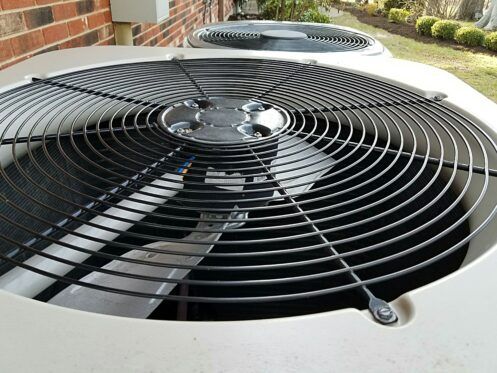Have you ever noticed a growing puddle of water in your house and realized it was coming from your HVAC system? Though most people assume that a broken HVAC component will lead to uncomfortable air temperatures, in some cases, it can also cause an inconvenient water leak. Any time you notice water coming from your air conditioner, it’s important to address the situation promptly. Not only can such a leak lead to water damage, but it can also result in major problems for your AC. To fix the problem and get your air conditioner running smoothly again, you’ll need to identify the cause of the water leak.
How to Tell If Your HVAC Is Leaking
Finding the source of a leak can be surprisingly tricky. If you see a suspicious puddle or hear dripping noises in your house, you’ll need to check your HVAC unit carefully to see if it’s the source of the water. Typically, a leaking HVAC system will result in water standing around either the indoor unit or the outdoor unit. Depending on where your HVAC is located, you might also notice water dripping through your ceiling or slowly soaking through a wall. In some cases, it may even start to drip out of HVAC vents or ducts. If you’re unsure whether your HVAC unit system is causing the leak, try turning it off for a little while. In most cases, the water leak will stop once your HVAC is no longer running.
Causes of a Leaking HVAC System
Your HVAC unit handles both the air and water in your home. One of its most important jobs is to remove moisture from the air and keep your home comfortable. However, there are many ways this can go wrong. Here are some of the most common reasons why an HVAC system might leak water.
A Clogged or Broken Condensate Drain Line
The condensate drain line is supposed to take water from your HVAC system and release it outside the home. When it’s operating correctly, you’ll notice a small pipe outside your house that continuously drips water. However, this high-moisture environment can have a lot of mold and fungi growth. It’s fairly common for debris to build up inside a drain line and keep water from flowing. When this happens, all the condensation from your HVAC system backs up and starts leaking inside your house. Some HVAC appliances are equipped with an emergency shutoff switch that will identify the problem and stop them from continuing to run and worsen the leak, but if you don’t have this, major leaks can occur.
Condensate drain lines can also cause problems if they become disconnected. Most drain lines consist of simple lengths of PVC running through your attic or walls. If something damages the piping system, it can disconnect or break in a way that lets water start leaking somewhere inside your house.
A Broken Condensate Pump
Many HVAC units are equipped with a condensate pump that helps to collect condensation and push it outside the house. These are especially useful for systems where the heater or air conditioner is located on a lower level than the condensate drain. However, when a pump malfunctions, it can quit moving water in the proper direction. This cause of a leaking AC is sometimes easy to fix. Many condensate pumps have a float that can get stuck, so adjusting the float will get your pump running smoothly again. However, in some cases, a condensate pump will have reached the end of its lifespan and require a replacement.
Frozen Evaporator Coils
The evaporator coils inside of an air conditioner cool air as it passes over them. However, if your rate of airflow isn’t fast enough, your evaporator coils start to cool the air too much. They build up a crust of ice on the outside of the coils. Then, when your AC shuts off, the ice melts and starts to drip into your home. If you have a leak and see ice anywhere in your system, evaporator coils are typically the culprit.
Frozen evaporator coils are often a sign that your air filter is so clogged with debris that it’s not letting enough air into your system. They can also occur if your AC fan motor is too low or if the interior of your AC unit is too dirty. In some cases, a frozen evaporator may also be due to low refrigerant levels. Since your refrigerant lines form a closed system, low refrigerant levels indicate that a leak somewhere in your system is causing your evaporator to malfunction.
Poorly Insulated Ductwork
If you have liquid dripping from your HVAC vents or ducts, poor insulation might be at fault. Due to the way condensation works, if you have warm air flowing over a cold surface, beads of moisture can build up on it. This can happen in a poorly insulated home. You end up with hot air flowing through the attic or the walls of the house, and when it comes in contact with the ducts carrying cold air, moisture starts to collect. If there is enough condensation, it creates visible droplets of water near parts of your HVAC unit. Fortunately, this issue is usually fast to repair and doesn’t cause too much water damage in your home.
A Malfunctioning Humidifier
If your home is outfitted with a humidifier and you notice a leak anywhere in your HVAC system, the humidifier is the first spot to check. Since a humidifier’s job is to add water to your air, a broken one can end up dumping too much water into your system. Any whole home humidifier is connected to a water supply line, so it can spring a leak just like any other part of your plumbing. When this happens, you can end up with a lot of moisture sitting around your HVAC system.
What to Do About a Leaking HVAC System
If you notice leaks, avoid running your HVAC system any more than necessary. This will help to keep the problem from worsening until you can get it checked out. In the meantime, you may be able to minimize damage by using a waterproof container to catch drips.
Usually, a leaking heating and cooling system is something that an HVAC professional can fix quickly. In many cases, they’ll just need to clean your drain line or patch a leak. However, some problems, like a broken pump, might take a little more time to replace. Whatever the issue, an HVAC technician can help you locate the cause of the leak and find a way to fix it.
For all your HVAC repairs, turn to Specialty Heating & Cooling LLC. Our highly trained professionals provide fast and effective help for leaking HVAC equipment. We also assist Tigard, OR residents with a variety of other HVAC services including installation and maintenance. Our team works on a range of heating and cooling systems, and we service water heaters and generators, too. Contact Specialty Heating & Cooling LLC to schedule a service visit today!


